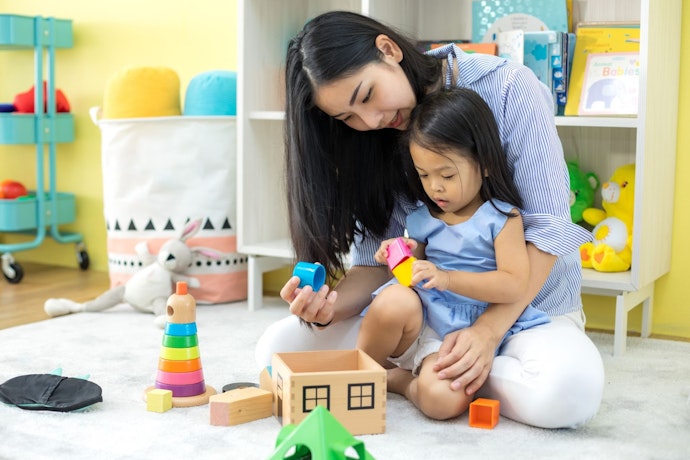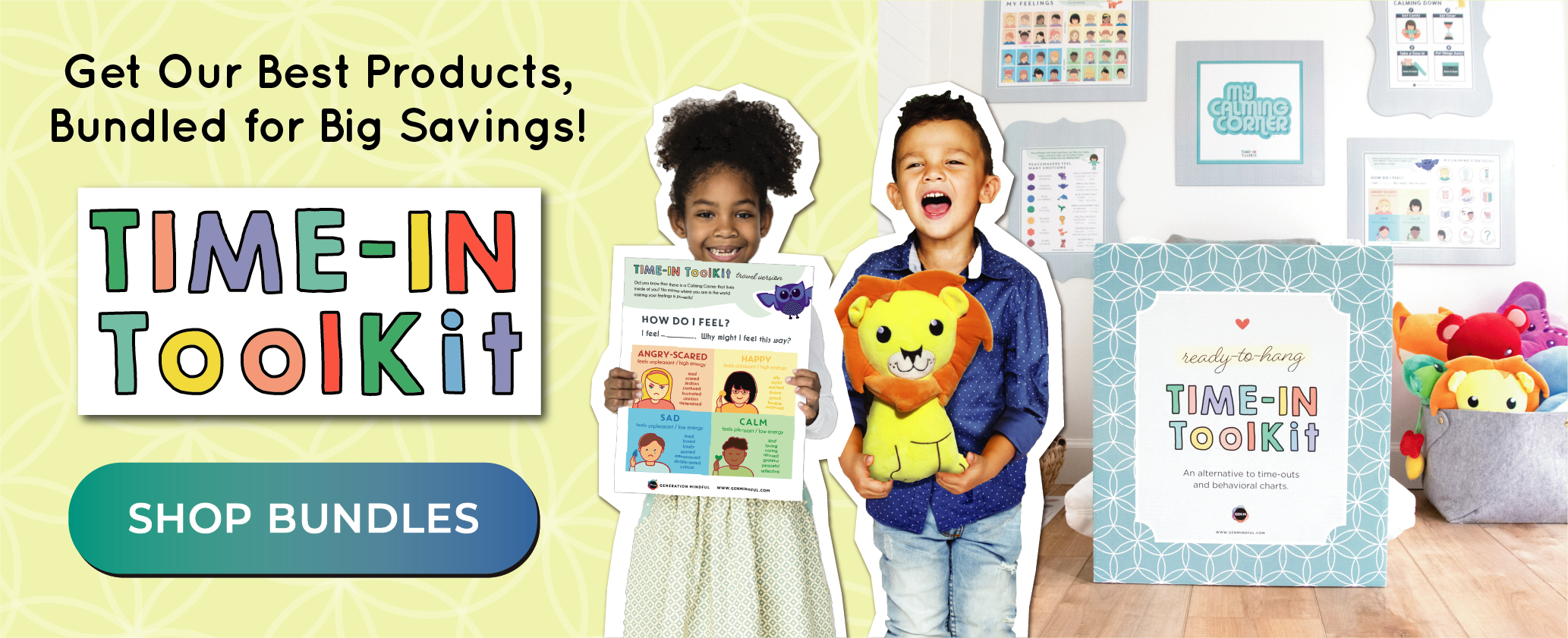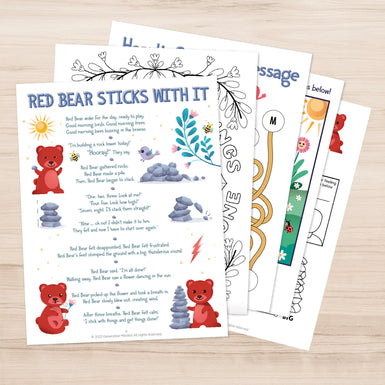You're in the midst of your morning routine, sipping your coffee and catching up on your phone, when your five-year-old suddenly starts having a meltdown because their favorite T-shirt is dirty. It's a whirlwind – clothes tossed around, tears streaming, and breakfast pushed to the back burner. Feeling overwhelmed, you wonder, "There has to be a better way to handle the emotional roller coaster that is my toddler, Help!”
Well, let me introduce you to Montessori parenting. Montessori parenting is all about encouraging emotional wellness, empathy, and resilience in kids. It's a way of nurturing a child's unique strengths and interests with an emphasis on child-led learning.
If you're wondering how to help kids understand their emotions and handle life's roller-coaster, Montessori parenting techniques might just be the key.
The Montessori Parenting Style: An Overview
Drawing inspiration from Dr. Maria Montessori, this style of parenting focuses on helping your child’s natural abilities shine and fostering a life-long love for learning. Here's what Montessori parenting looks like:
• Respecting a child's pace: Believe in your child's ability to learn, grow, and explore the world at their own rhythm. Learn to step back, observe, and let them make decisions.
• Encouraging curiosity: Kids learn by engaging and doing!
• Fostering a child's natural abilities and interests: Help your children develop their interests, instead of imposing one-size-fits-all activities.
• Creating an enabling environment: Craft a space that encourages independent learning, with easy-to-reach resources, child-sized furniture, and age-appropriate materials.
• Promoting problem-solving: Teach your child how to tackle issues and interact with peers, thereby developing problem-solving abilities.
The goal is to nurture your child’s inherent strengths, preferences, and interests and empower them with the confidence and skills they need to succeed in life.
Emotional Health: Its Importance in Child Development
If you’re a parent, you are probably aware of your child’s motor development, and you celebrate every time they reach a new milestone like walking, talking, tying their shoes, or riding a bike. However, even though research shows that a child’s emotional development is crucial to their lifelong learning potential, happiness, and success, far too often, emotional literacy and the milestones that go with it all too often go overlooked.
In very simple terms, a child's emotional health boils down to their ability to understand emotions, express feelings, and make social connections. It's not about eliminating negative emotions, but, rather, it’s about strengthening a child's ability to recognize, learn from, and manage or “regulate” their emotions effectively.
Why is emotional health vital in child development?
Individuals with high emotional intelligence can recognize their feelings and understand why they feel certain ways. This self-awareness enhances their ability to express emotions.
Kids with strong emotional skills can also make more informed decisions. They can consider their emotions and potential outcomes before making choices.
Nurturing a child's emotional health equips children of all ages with the ability to manage life's ups and downs, also known as ‘resilience’, a key characteristic of Montessori parenting.
Emotional Outbursts and Montessori Parenting: A Resolution Approach
If you’re like me, the only thing you dread more than a meltdown at home is a public meltdown. The tears, the crying, and the yelling are hard enough, but then add an audience and it’s easy to see why it’s easy to feel embarrassed. Here's the good news: the Montessori parenting style offers a helpful resolution.
Instead of punishment, the goal is to understand their feelings, show patience, and guide your child toward a solution.
Let's consider the following situation: Your son sees a shiny red toy car in the store and wants it. After you kindly remind him that you're at the store to buy a gift for his best friend's birthday party tomorrow, he has a breakdown. Here's the Montessori approach to navigating your child's upset:
1. Identify the Emotion: Talk to your son and acknowledge his feelings, "I see you're feeling upset because you want the toy car." This helps label his feelings of disappointment.
2. Assure: Take a deep breath and pause: Remaining present and calm sends a power signal to your child’s brain that helps him understand that it's perfectly fine to feel upset in such situations.
3. Empathize: Show him that you relate to his feelings. "It can be hard when we can't have something we want."
4. Offer Solutions: Guide him towards a resolution. Maybe he can set a goal to save his money to buy the toy. This strategy gives children a sense of control and can lessen the sense of frustration they may be feeling.
For young children, and/or those who struggle with impulse control, another helpful strategy is to invite your son to take a picture of the toys he likes so that together, after your shopping trip, you can add them to a Holiday or Birthday Wish List. Even if this is months away, the act of taking photos gives children a sense of control and can help them regulate feelings of desire and disappointment. Both approaches teach children that their feelings matter and build their capacity for emotional resilience.
Tools for Teaching Emotional Intelligence in the Montessori Approach
The right tools can promote emotional intelligence and bring to life the Montessori parenting approach. Here are some options:
• Time-In ToolKit: A teaching resource that helps kids understand and handle a range of emotions using play-based activities and experiences. Don't wait until your child is dysregulated to teach them the skills they need to navigate big emotions and upset.
• PeaceMakers Mindfulness Cards: An engaging activity, with 42 positive affirmations kids love; great conversation starters for building empathy, resilience, and emotional intelligence in daily playful ways, with more than six ways to play with the cards.
• SnuggleBuddies: A set of friendly emotional plush toys featuring happy, sad, calm, and mad/scared mood emojis inside every plush. This tool helps young children put words to their feelings, raising emotional awareness and expression.
Data collected by the Missouri Institute of Mental Health shows that 9 out of 10 caregivers found the above tools helped young children learn to regulate emotions in positive ways that complement the Montessori parenting style.
The Power of Dialogue: Communication and Montessori Parenting
Montessori parenting places a high value on communication. Open, honest dialogue bridges the emotional gap between parent and child, building understanding and empathy.
Here’s what the common parenting approach to setting a limit might unfold:
CHILD: "Mom, why can't I wear my superhero cape to school?"
PARENT: "Because I said so."
In the Montessori parenting way:
CHILD: "Mom, why can't I wear my superhero cape to school?"
PARENT: "I can see how much you love wearing your cape. It's time for school, and your school has a dress code. You can wear your cape after school. Would you like to pack it in your bag or put it in the car so we have it when I pick you up?"
In the second conversation, the Montessori technique empathizes with the child's feelings, calmly delivers a boundary, welcomes dialogue, and explains the parent's reasoning instead of simply delivering a blunt restriction.
Positive communication like this not only builds emotional connection but also boosts emotional health and resilience. The Montessori parenting approach highlights that even everyday conversations can build emotional intelligence and understanding.
Montessori Techniques: Practical Implementations at Home
Ready to try out the Montessori parenting style? Here are some ways to apply it at home:
1. Create a child-friendly environment: Your home should feel safe, engaging, and suited to children. This means worktables, shelves, and things at a child's level.
2. Promote independence: Let your child do what they can manage independently - pouring milk, picking clothes, or tidying toys. This builds self-esteem.
3. Encourage curiosity: Encourage their interests and passions instead of prescribing what your children should learn. This stimulates natural learning.
4. Show respect: Teach your child to respect others, their surroundings, and themselves. This can be through actions or discussions about feelings.
5. Use tools that aid emotional understanding: Tools like the Time-In ToolKit or PeaceMakers can be useful aids in teaching children about emotions and empathy.
These methods should foster your child's emotional health and essential life skills important for their overall growth. Remember, the Montessori parenting approach is not about strict rules but about adapting the guidance to work best for your family. After all, as the most significant figure in your child's life, you are their best teacher.




























